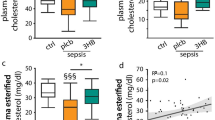Summary.
Fatty acid oxidation is usually thought of as being a preferred ATP source during sepsis, as shown by the decrease in respiratory quotient in septic patients and animals. However, fatty acid oxidation may be impaired relative to circulating triglyceride levels, resulting in increased cycling between triglycerides and non-esterified fatty acids. The rate of fatty acid oxidation is critically dependent on the stage of sepsis. Carnitine may be depleted during sepsis by a combination of muscle wasting, erythrocyte haemolysis, decreased tissue uptake, reduced kidney reabsorption of free carnitine, and increased excretion of acyl-carnitines. Whether there may be any beneficial effects of carnitine supplementation during sepsis, is, as yet, uncertain.
Similar content being viewed by others
Author information
Authors and Affiliations
Corresponding author
Rights and permissions
About this article
Cite this article
Eaton, S., Pierro, A. Carnitine and Fatty Acid Oxidation in Sepsis. Monatsh. Chem. 136, 1483–1492 (2005). https://doi.org/10.1007/s00706-005-0316-9
Received:
Accepted:
Published:
Issue Date:
DOI: https://doi.org/10.1007/s00706-005-0316-9




